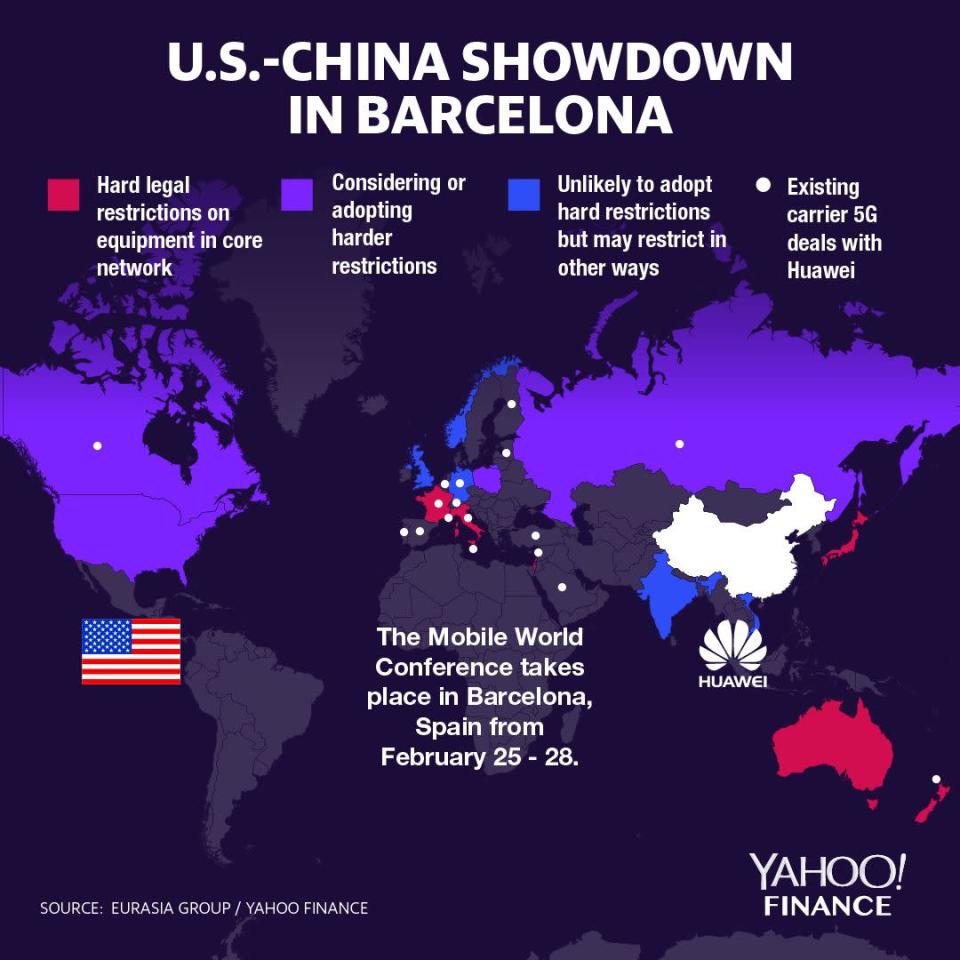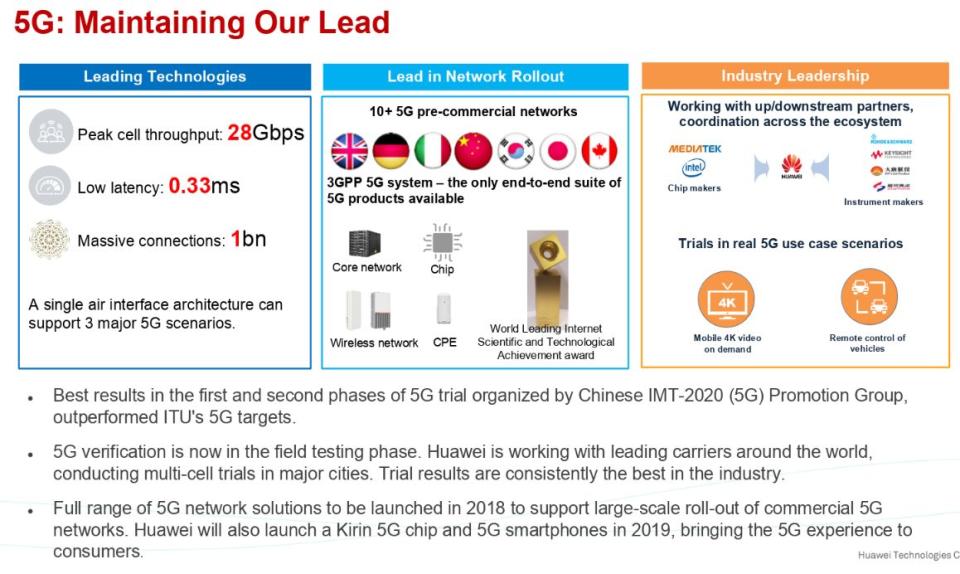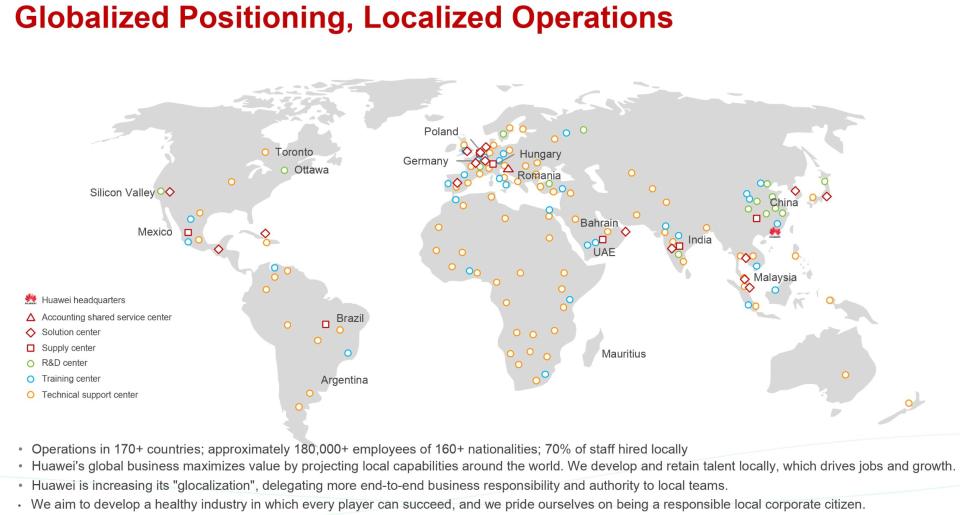U.S.-China showdown: Huawei has 'completely taken over' the Mobile World Congress
Washington’s campaign to restrict the integration of Chinese telecommunications equipment maker Huawei in 5G networks shifts to Barcelona this week as global industry leaders gather for an emergency meeting on the sidelines of the Mobile World Congress (MWC) to discuss the possibility of excluding the Shenzhen-based vendor from European markets.
While the U.S. has successfully lobbied close allies Australia, New Zealand, and Japan to block the use of Huawei equipment in its 5G infrastructure on national security grounds, it has faced increasing pushback in Europe amid cost concerns and skepticism over Washington’s claims that the company poses a risk.
‘The Huawei issue has now completely taken over‘
Earlier this month, GSMA, an industry group and host of MWC in Barcelona, cautioned against restrictions on Chinese equipment. GSMA stated that European telecom operators and citizens would end up paying the cost while 5G deployment would delayed years across Europe.
“Barcelona is normally the place where deals are made, with big announcements about carriers choosing equipment suppliers and discussions about 5G use cases,” Paul Triolo, Head of Global Technology Policy Analyst at Eurasia Group, told Yahoo Finance. “The Huawei issue has now completely taken over the normal course of events.”
All of this sets the stage for a U.S.-China showdown of sorts at the annual event better known for unveiling tech gadgets than foreign policy.

‘No way U.S. can crush us’
Huawei and Washington have been engaged in a public battle in the lead-up to the conference. On a recent trip to Hungary, Secretary of State Mike Pompeo suggested that relations with allies would suffer if they refused to restrict Huawei equipment, saying “if that equipment is co-located where we have important American systems, it makes it more difficult for us to partner alongside them.”
Huawei founder Ren Zhengfei dismissed U.S. accusations that Beijing could use the company’s vast network as a tool for surveillance, telling the BBC that his company “would never undertake any spying activities.” He added that there’s “no way [the] U.S. can crush us.”

Washington has repeatedly pointed to Chinese legislation passed in 2017 allowing the intelligence agency to compel individual organizations to “provide necessary support, assistance, and cooperation” as proof that Huawei cannot be trusted.
But while the U.S. Department of Justice has filed criminal charges against the company — alleging theft of trade secrets, bank and wire fraud, violations of Iran sanctions, and conspiracy to commit money laundering — it has not provided public evidence proving Huawei created back doors to spy or disrupt communications.
‘You have different countries taking different sides’
The issue is particularly complicated for some European countries, where Huawei accounts for 50-to-80% of existing mobile infrastructure and telecom providers have already begun integrating its equipment as part of a broader 5G rollout.
Recent reports suggest the UK and Germany are unlikely to push for an outright ban but may find ways to limit the risks while integrating Huawei equipment in 5G networks. Others like Poland are considering shutting out the Chinese company altogether after a Huawei employee and a Polish employee of the telco operator Orange were arrested on spying allegations.

“The preference is to have an EU wide decision on this because of the way it looks right now. You have different countries taking different sides with mishmash approaches to this,” Triolo said. “That makes it complicated for carriers that operate across jurisdictions like Vodafone.” Vodafone (VOD), a global 5G partner of Huawei, recently paused installing Huawei into its core European networks.
Some experts believe there is still time to turn away from Huawei. James Lewis, Director of the Technology and Public Policy Program at the Center for Strategic International Studies, recently argued that Huawei’s importance in the 5G buildout has been overstated.
“Right now Huawei is not indispensable,” Lewis, a former Foreign Service Officer at the Department of State, told Yahoo Finance’s On The Move (video above). “Some studies suggest they can be 20% cheaper because of the subsidies they get from the Chinese government… but you don’t have to buy Huawei if you want to buy 5G.”
‘Mr. President. I cannot agree with you more‘
Triolo noted that Washington’s shifting narrative has also muddled the picture.
After repeatedly suggesting Huawei posed a national security risk, Trump backed off the harsh rhetoric last week when he tweeted that the U.S. should “win through competition, not by blocking out currently more advanced technologies.” His message came amid reports the U.S. was inching closer towards a broader trade deal with China after months of friction.
....something that is so obviously the future. I want the United States to win through competition, not by blocking out currently more advanced technologies. We must always be the leader in everything we do, especially when it comes to the very exciting world of technology!
— Donald J. Trump (@realDonaldTrump) February 21, 2019
Huawei’s rotating Chairman Ken Hu responded to Trump on Twitter, saying: “Mr President, I cannot agree with you more. Our company is always ready to help build the real 5G network in the US, through competition.” (Huawei confirmed the authenticity of the tweet to Yahoo Finance.)
Mr. President. I cannot agree with you more. Our company is always ready to help build the real 5G network in the US, through competition.
— Ken HU (@KenHu68) February 21, 2019
The GSMA board meeting in Barcelona won’t be limited to European carriers and will include Chinese operators like China Mobile. That will be followed by ministerial meetings later in the week.
A large U.S. delegation including FCC Chairman Ajit Pai will be looking to find some middle ground with government and business leaders to limit Huawei’s growth. But that could be a tough sell given that Huawei equipment currently accounts for 28% of global market share, according to Dell’Oro Group, with Ericsson (ERIC) and Nokia (NOK) trailing behind.
Samsung is ramping up investments in 5G telecom network equipment business to fill the potential Huawei void, according to Reuters. But with the company accounting for just 3% of the global infrastructure on 4G, it may not have the capacity to meet demand.
“The U.S. government came up with the ban idea but they didn’t appreciate what the cost of that would be from a carrier point of view for equipment, and they didn’t really think out how you replace capacity in the network,” Triolo said. “Those are issues beyond the ability of the government.”
READ MORE: What is Huawei? China crown jewel now in US crosshairs
Follow Yahoo Finance on Twitter, Facebook, Instagram, Flipboard, LinkedIn, YouTube, and reddit.

